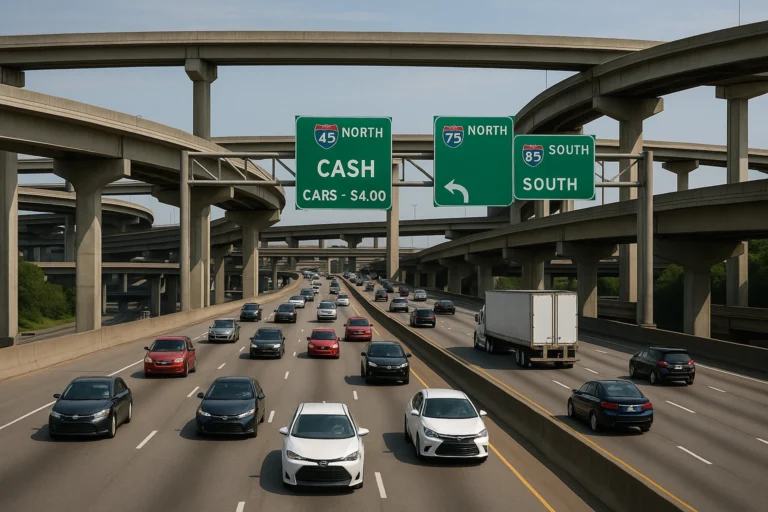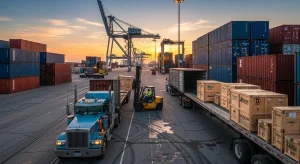The International Bridge, Tunnel and Turnpike Association (IBTTA), headquartered in Washington, D.C., is urging lawmakers to adopt user-based funding models — including more tolling — as a way to modernize and maintain America’s transportation network.
The U.S. transportation system is facing a growing challenge: the widening gap between available funding and the actual costs of maintaining and upgrading critical infrastructure. With federal revenues shrinking, particularly from the long-stagnant gas tax, policymakers and industry leaders are searching for sustainable solutions.
In this context, the International Bridge, Tunnel and Turnpike Association (IBTTA), based in Washington, D.C., has submitted a formal proposal to the U.S. Department of Transportation (USDOT), calling for greater reliance on user-based funding models, especially tolls.
A key player in U.S. transportation policy
IBTTA is an international trade association representing toll facility operators, roadway authorities, and service providers across the globe. From its Washington headquarters, the association advocates before Congress, USDOT, and other government agencies, positioning tolling as a reliable and proven tool to finance transportation infrastructure.
According to IBTTA data, 132 toll operators across 33 states handle nearly 10 billion transactions each year, generating more than $25 billion annually. These revenues are reinvested directly into roads, bridges, and tunnels, creating a self-sustaining cycle of infrastructure upkeep and modernization.
The decline of the gas tax
For decades, the federal gas tax has been the backbone of the Highway Trust Fund. But that model is faltering. On one hand, the rapid growth of electric and hybrid vehicles is reducing fuel consumption, shrinking tax collections. On the other, Congress has failed to increase the gas tax in decades, leaving it eroded by inflation.
As a result, the U.S. faces a structural funding shortfall. IBTTA argues that the only long-term solution is to adopt a new paradigm: one in which those who use the infrastructure pay directly for it.

Why tolling?
In its submission to USDOT, IBTTA highlighted several advantages of tolling:
- Financial sustainability – Tolls provide a steady, predictable stream of revenue, insulated from political gridlock.
- Direct reinvestment – Funds go directly back into the road, bridge, or tunnel where they are collected.
- Technological efficiency – Electronic tolling and “open road” systems allow vehicles to pay without slowing down, cutting costs and improving traffic flow.
- User equity – The people who use the infrastructure most contribute the most, instead of spreading the costs across all taxpayers.
IBTTA also pointed to advances in all-electronic tolling systems that eliminate traditional toll plazas and reduce congestion impacts.
Pushback and controversy
Despite these advantages, the idea of expanding tolling faces significant resistance. Critics argue that:
- Truckers and freight carriers would see increased operating costs, driving up logistics expenses and consumer prices.
- Low-income drivers would be disproportionately affected, as a greater share of their income would go toward tolls.
- Tolling could accelerate the privatization of public roads, raising concerns about lack of transparency and unchecked price hikes.
These criticisms reflect the tension between the pressing need to fix America’s roads and bridges and the political and social costs of asking drivers to pay more directly.
The federal policy context
The IBTTA’s call comes as USDOT is preparing its next surface transportation proposal, which will shape national priorities for infrastructure investment and funding mechanisms in the years ahead.
For IBTTA, this is the moment to elevate “pay-per-use” models as credible alternatives to the eroding gas tax. In the association’s words: “More tolling means more resources for safer roads, stronger bridges, and modern tunnels.”
Looking ahead: the future of U.S. road funding
The tolling debate ties into a larger national question: how to fund infrastructure in a country with aging highways, structurally deficient bridges, and rapidly expanding mobility needs.
Some stakeholders call for greater federal spending, while others push for public-private partnerships. IBTTA maintains that tolling will be an inevitable component of a fair and sustainable funding system.
As congestion worsens and supply chains grow more complex, the expansion of tolling is likely to be at the center of America’s transportation policy debates in the coming years.

Lunar New Year 2026: Ancient Traditions, Renewed Energy, and Massive Celebrations
Lunar New Year 2026 begins on February 17 under the sign of the Fire Horse and is marked by spiritual rituals, family reunions, and large-scale celebrations in both China and the United States, especially in California.

Freedom 250 Grand Prix: How Logistics and Transportation Will Power the Race in Washington
The first-ever IndyCar street race in Washington, D.C., scheduled for August 21–23, will headline the United States’ 250th anniversary celebrations — and it will trigger a massive transportation, freight, and urban logistics operation behind the scenes.

Groundhog Day: What It Means for Trucking When “Phil Sees His Shadow”
The forecast from America’s most famous groundhog is calling for more winter — and that’s an important signal for the trucking industry and cold-season route planning

Love on the open road: the best dating apps for truckers
If you’re looking for someone to go the long haul with, here are the best dating apps for truck drivers. They say love is everywhere…

The most congested cities in the U.S. and the world in 2025
The annual TomTom Traffic Index produces a ranking of the most congested cities in the world. The annual TomTom Traffic Index presents an analysis of

Steady Growth Signals Strong Momentum in the U.S. Trucking Industry
Trucking growth in the United States is gaining strength in 2026, driven by higher freight demand, expanding logistics activity, and new opportunities for carriers and fleet operators.
